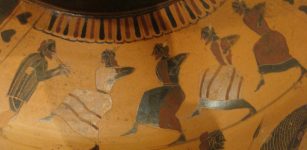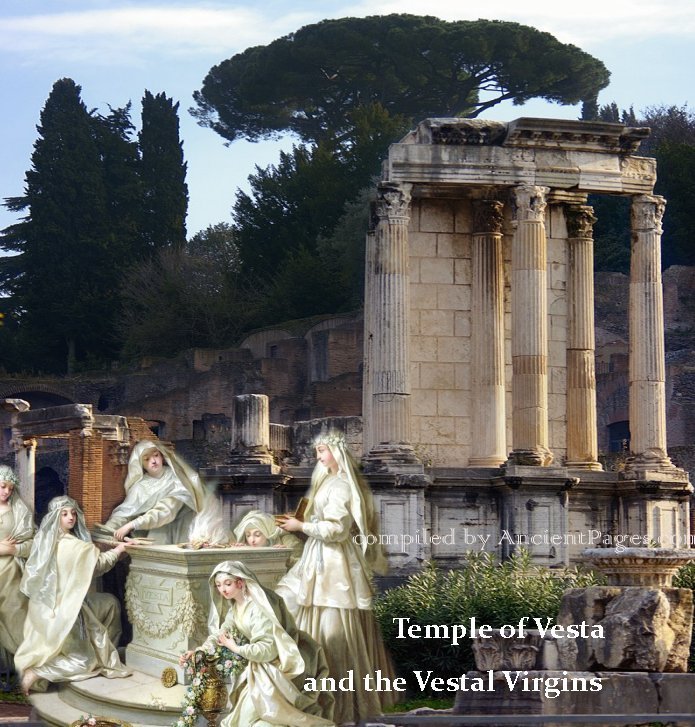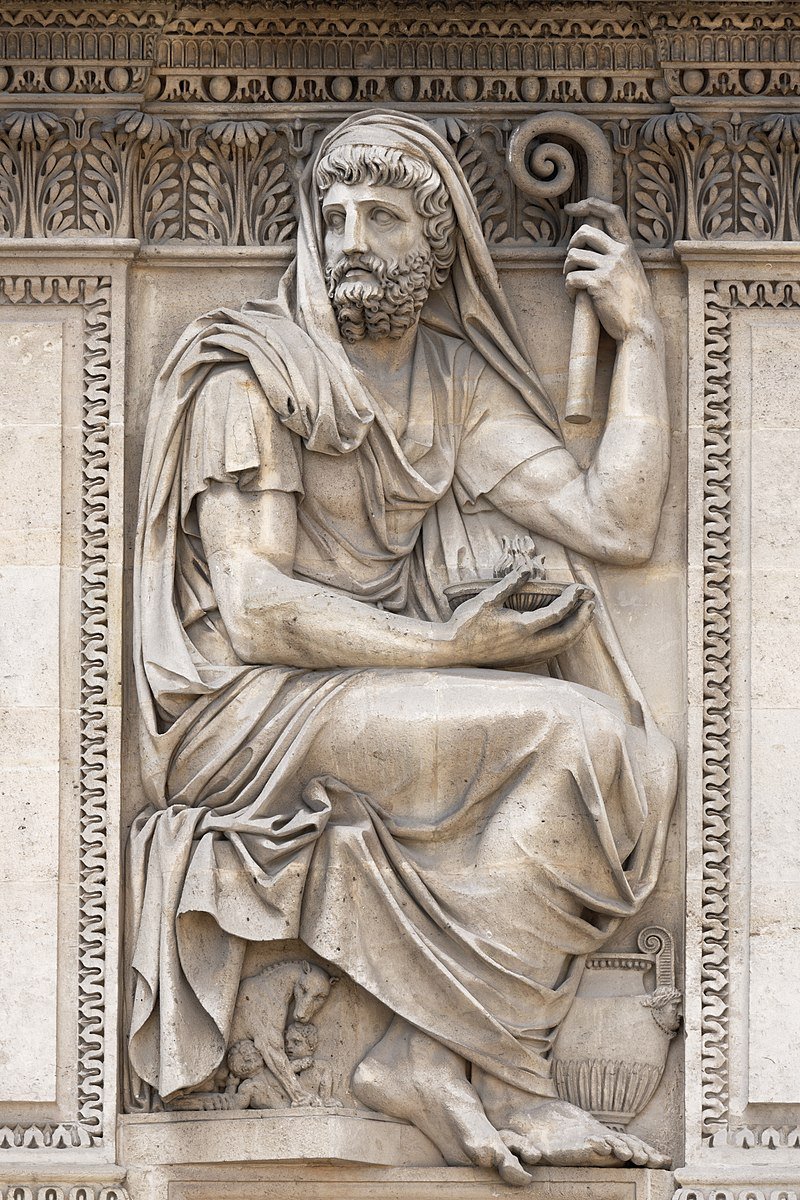Numa Pompilius – Remarkable Legendary Second King Of Ancient Rome Who Succeeded Romulus – Did He Ever Exist?
A. Sutherland - AncientPages.com - Legends say Numa Pompilius was the second king of Rome, but he was not a warrior king but a statesman and politician.
Numa introduced new laws, customs, cults, and holidays during his reign. In contrast to the times of King Romulus and the city of Rome's involvement in wars, the ruler Numa Pompilius wanted Rome to experience quieter times.
But How Did Numa Pompilius Come To Power?
As the legend says, after the death of the legendary Romulus, there was a long, tiring dispute on the next succession to the throne. Finally, Pompilius (known for purity and wisdom) was chosen and agreed upon; however, he had to ask the gods first. The fortune-tellers were successful, and Numa put on royal robes.
The new ruler began with changes regarding religion and claimed that these changes had to occur because Egeria (a mythological water nymph who was his wife and counselor) had ordered him to do it.
Such alleged connections with the supernatural forces had raised Numa's authority and prestige.
Did Numa Pompilius Really Exist?
It is uncertain whether this fascinating figure really existed. There are only legends about his life but no actual historical facts. According to ancient tradition, he belonged to the Sabines (an Italic tribe from the central Apennines) and was born on the day Rome was founded (753 BC). He ruled from 715 BC until he died in 672 BC. He was about 40 years old at the time he took power.
Numa Pompilius at the Louvre, by Jean Guillaume Moitte. Image credit: Marie-Lan Nguyen - Public Domain
Numa created various offices and authorities for civic workers and came up with January, February, and a calendar system that influenced our modern calendar. He also adjusted the solar and lunar years.
The 10-month year had been replaced by a year divided into 12 lunar months. It counted 354 days; every 19 years, there were leap months.
Unfortunately, there is not much information about this calendar. In addition, the king made a list of successful days (dies fasti) and unfavorable days (dies nefasti). On unfortunate days, conducting court hearings or convening a gathering of citizens was optional.
According to Plutarch (46 AD – 120 AD), Numa was a wise and religious man who ordered the construction of a temple dedicated to Janus in Rome. Janus was the two-faced god of boundaries, and his temple was not ordinary. Its doors (the "Gates of Janus") were closed in times of peace and opened in times of war.
Egeria Gives the Laws of Rome to Numa Pompilius, Anna Ottani Cavina, Spanish Embassy to the Holy See, Rome, 1806.
For three great deities of Rome, Jupiter, Mars, and Quirinus (Quirinus is the name under which Romulus was worshiped), Pompilius introduced special priests. He brought Vestal Virgins (priestesses of Vesta, goddess of the hearth) to Rome. The Vestals were freed of the usual social obligations to marry and bear children. They took a vow of chastity to devote themselves to the study and correct observance of state rituals that were off-limits to the male colleges of priests.
Numa was said to have authored several "sacred books" containing divine teachings, mostly from Egeria and the Muses.
However, Numa Pompilius could not be a Pythagorean student – as referred by Plutarch and a Roman historian Livy, because an Ionian Greek philosopher, Pythagoras, was born 100 years later, c. 570 BC.
On the other hand, the second king of Rome died in 672 BC, if we believe the legends and myths surrounding the second king of Rome.
If he had existed, he probably could not have contributed to many significant achievements and carried out all new reforms in his city of Rome.
If he did (Numa ruled for 43 years), he was indeed a remarkable Roman leader. However, many believe that all-important changes in Roman religion and the peoples' customs took a long time and differed from one individual's work.
Written by A. Sutherland – AncientPages.com Staff Writer
Updated on January 13, 2024
Copyright © AncientPages.com All rights reserved. This material may not be published, broadcast, rewritten or redistributed in whole or part without the express written permission of AncientPages.com
Expand for referencesMore From Ancient Pages
-
 Dance Was A Gift Of The Gods To Ancient Greeks
Featured Stories | Oct 4, 2021
Dance Was A Gift Of The Gods To Ancient Greeks
Featured Stories | Oct 4, 2021 -
 Bronze Age Swords Were Used By Skilled Fighters – New Study
Archaeology | Apr 29, 2020
Bronze Age Swords Were Used By Skilled Fighters – New Study
Archaeology | Apr 29, 2020 -
 Intriguing Ptolemaic And Roman Treasures Unearthed In Al Bahnasa, Egypt
Archaeology | Jan 10, 2024
Intriguing Ptolemaic And Roman Treasures Unearthed In Al Bahnasa, Egypt
Archaeology | Jan 10, 2024 -
 Famous Bayeux Tapestry May Solve The Planet Nine Mystery
Archaeoastronomy | May 5, 2018
Famous Bayeux Tapestry May Solve The Planet Nine Mystery
Archaeoastronomy | May 5, 2018 -
 The ‘Walking Under Ladder’ Superstition Can Be Traced To Ancient Egypt
Ancient Idioms & Superstitions | Aug 26, 2015
The ‘Walking Under Ladder’ Superstition Can Be Traced To Ancient Egypt
Ancient Idioms & Superstitions | Aug 26, 2015 -
 Oldest Carving Of A Penis Discovered On Ancient Mongolian Pendant
Archaeology | Jun 20, 2023
Oldest Carving Of A Penis Discovered On Ancient Mongolian Pendant
Archaeology | Jun 20, 2023 -
 Sigurd Fafnirsbane – Legendary Dragon Slaying Warrior And His Magical Sword
Featured Stories | Oct 30, 2017
Sigurd Fafnirsbane – Legendary Dragon Slaying Warrior And His Magical Sword
Featured Stories | Oct 30, 2017 -
 Socrates: Great Philosopher And Brave Man Who Still Inspires Many People
Featured Stories | Jul 21, 2016
Socrates: Great Philosopher And Brave Man Who Still Inspires Many People
Featured Stories | Jul 21, 2016 -
 Magnificent Skellig Michael And A 1,400-Year Old Christian Monastery
Featured Stories | Feb 8, 2016
Magnificent Skellig Michael And A 1,400-Year Old Christian Monastery
Featured Stories | Feb 8, 2016 -
 Cursed Biblical City Bethsaida May Have Been Found – But Scientists Argue About The Discovery
Archaeology | Sep 1, 2020
Cursed Biblical City Bethsaida May Have Been Found – But Scientists Argue About The Discovery
Archaeology | Sep 1, 2020 -
 What Are The Most Common Misconceptions About Pirates?
Ancient History Facts | Apr 16, 2024
What Are The Most Common Misconceptions About Pirates?
Ancient History Facts | Apr 16, 2024 -
 Akrotiri Of Thera: Sophisticated City In The Greek Cyclades Devastated By Volcanic Eruption
Civilizations | Jul 6, 2016
Akrotiri Of Thera: Sophisticated City In The Greek Cyclades Devastated By Volcanic Eruption
Civilizations | Jul 6, 2016 -
 Scipio Africanus – Rome’s Greatest General Who Defeated Unbeatable Hannibal
Featured Stories | Aug 5, 2021
Scipio Africanus – Rome’s Greatest General Who Defeated Unbeatable Hannibal
Featured Stories | Aug 5, 2021 -
 Large Fortress And Wall Uncovered On The Nile Delta Mark Power Of Egypt’s Canal Of the Pharaohs
Archaeology | Dec 29, 2017
Large Fortress And Wall Uncovered On The Nile Delta Mark Power Of Egypt’s Canal Of the Pharaohs
Archaeology | Dec 29, 2017 -
 Aztec Treasure: ‘Yew Of Gold’ Found 39 Years Ago Originates From Spanish Plunder During ‘Sad Night’ In 1520
Archaeology | Jan 12, 2020
Aztec Treasure: ‘Yew Of Gold’ Found 39 Years Ago Originates From Spanish Plunder During ‘Sad Night’ In 1520
Archaeology | Jan 12, 2020 -
 Armenia: Old Land Where Myths, Legends And Long History Meet
Civilizations | Apr 20, 2016
Armenia: Old Land Where Myths, Legends And Long History Meet
Civilizations | Apr 20, 2016 -
 Leprechaun: One Of The Most Famous And Powerful Creatures Of The Irish Faerie Folk
Celtic Mythology | May 8, 2016
Leprechaun: One Of The Most Famous And Powerful Creatures Of The Irish Faerie Folk
Celtic Mythology | May 8, 2016 -
 New Huge Viking Ship Discovered By Radar In Øye, Norway – What Is Hidden Beneath The Ground?
Archaeology | Apr 9, 2022
New Huge Viking Ship Discovered By Radar In Øye, Norway – What Is Hidden Beneath The Ground?
Archaeology | Apr 9, 2022 -
 DNA Sheds Light On Ancient History Of Dogs All The Way To The Ice Age
Archaeology | Oct 30, 2020
DNA Sheds Light On Ancient History Of Dogs All The Way To The Ice Age
Archaeology | Oct 30, 2020 -
 Underground City And Pyramid Discovered At Tiahuanaco, Bolivia
Archaeology | Aug 3, 2018
Underground City And Pyramid Discovered At Tiahuanaco, Bolivia
Archaeology | Aug 3, 2018



